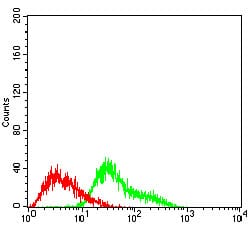

| WB | 咨询技术 | Human,Mouse,Rat |
| IF | 咨询技术 | Human,Mouse,Rat |
| IHC | 咨询技术 | Human,Mouse,Rat |
| ICC | 技术咨询 | Human,Mouse,Rat |
| FCM | 1/200 - 1/400 | Human,Mouse,Rat |
| Elisa | 1/10000 | Human,Mouse,Rat |
| Aliases | GS; DP2; DP3; BTPS2; DP2.5; PPP1R46 |
| Entrez GeneID | 324 |
| clone | 1F7G2 |
| WB Predicted band size | 311.6kDa |
| Host/Isotype | Mouse IgG1 |
| Antibody Type | Primary antibody |
| Storage | Store at 4°C short term. Aliquot and store at -20°C long term. Avoid freeze/thaw cycles. |
| Species Reactivity | Human |
| Immunogen | Purified recombinant fragment of human APC (AA: 2644-2843) expressed in E. Coli. |
| Formulation | Purified antibody in PBS with 0.05% sodium azide. |
+ +
以下是关于APC抗体的3-4篇参考文献的简要总结,涵盖不同研究方向:
---
1. **文献名称**:*Inactivation of APC in colorectal cancer cells leads to loss of Wnt signaling and inhibition of proliferation*
**作者**:Munemitsu S, et al.
**摘要**:本研究利用APC抗体进行免疫沉淀和Western blot分析,证实APC基因失活导致β-catenin异常积累,破坏Wnt信号通路并抑制结直肠癌细胞增殖,揭示了APC在肿瘤发生中的关键作用。
2. **文献名称**:*Functional interaction of an axin homolog, conductin, with beta-catenin, APC, and GSK3beta*
**作者**:Behrens J, et al.
**摘要**:通过APC抗体的免疫共沉淀实验,发现Axin同源蛋白conductin与APC、β-catenin及GSK3β形成复合物,阐明了APC在调控β-catenin降解中的分子机制。
3. **文献名称**:*Immunohistochemical detection of truncated APC protein in colorectal cancer*
**作者**:van der Linden RR, et al.
**摘要**:开发了一种特异性识别截短型APC蛋白的抗体,用于结直肠癌组织免疫组化检测,证实其表达与APC基因突变高度相关,为临床诊断提供了新工具。
4. **文献名称**:*APC mutations in colorectal tumors with mismatch repair deficiency*
**作者**:Miyaki M, et al.
**摘要**:结合APC抗体检测和基因测序,分析了错配修复缺陷结直肠肿瘤中APC突变的发生率,发现其与微卫星不稳定性相关,为分子分型提供依据。
---
**注**:上述文献方向涵盖APC蛋白功能机制、分子相互作用、诊断应用及突变分析,反映了APC抗体在基础研究与临床中的多样化应用。实际引用时建议核对文献具体内容及发表年份。
**Background of APC Antibodies**
Antibodies targeting the adenomatous polyposis coli (APC) protein are essential tools in cancer research and diagnostics. The APC gene, located on chromosome 5q22. encodes a multifunctional tumor suppressor protein critical for regulating the Wnt/β-catenin signaling pathway. APC mutations are strongly linked to familial adenomatous polyposis (FAP) and sporadic colorectal cancers, where truncated, non-functional APC proteins accumulate β-catenin, driving uncontrolled cell proliferation.
APC antibodies are designed to detect specific epitopes of the APC protein, enabling researchers to study its expression, localization, and interactions. These antibodies are widely used in techniques like Western blotting, immunohistochemistry (IHC), and immunofluorescence (IF) to assess APC levels in tissues or cell lines. Loss of APC expression, detected via these antibodies, serves as a biomarker for tumorigenesis and disease progression.
Additionally, APC antibodies aid in exploring the protein’s roles beyond Wnt signaling, including its involvement in cytoskeletal organization, cell migration, and apoptosis. Monoclonal and polyclonal variants offer flexibility in experimental design, with some antibodies targeting mutation-prone regions to identify pathogenic variants.
Overall, APC antibodies are pivotal in unraveling the molecular mechanisms of colorectal cancer and developing targeted therapies, while also contributing to broader studies in cell biology and genetic disorders.
×